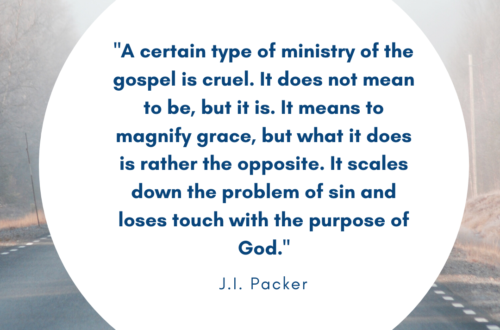
A Glorious Intermingling
A few weeks ago, a Christmas song I’ve heard dozens of times before without having an emotional reaction to brought me to tears as I drove down the street, feeling the weight of the words for the first time.
Maybe you’ve heard the song, too. It’s called “Joseph’s Lullaby,” by the popular Christian band Mercy Me.
In years past, the lyrics have even bothered me a little bit, particularly this line:
“Go to sleep my son, go and chase your dreams. This world can wait for one more moment, go and sleep in peace.”
Chase your dreams? I often wondered when I heard this. Jesus came to redeem sinners and restore God’s kingdom, not to chase his dreams!
But this year, these words hit my heart in a completely different way. It could be the fact that I’m 27 weeks pregnant and tearing up over any little thing these days (yes, I’m blaming the hormones!). Maybe it’s because my own little boy’s personality has exploded over the last 6 months, and everything that he does these days delights me. The thought of him growing up and running away from my arms instead of into them always makes my heart ache a little bit. Or it could be because I write character driven books, where I dive deeply into emotions to give my readers a glimpse into someone else’s world—and I feel these emotions so strongly, as if they were my own.
Whatever the case may be, every time this song comes on the radio now, I turn the volume up and marvel over something I’d missed in years past.
The fact that God chose to carry out his glorious salvation plan through humanity.
God didn’t need to send the Savior into a family—he could have just sent him down from heaven all on his own. And if he had done this, Mary and Joseph would have been spared from the emotional pain that very likely accompanied the joy of raising the Son of God. Because surely, they had to have some idea of what awaited their son. The book of Matthew seems to point to this. While still grappling with the shocking news that his fiancée was pregnant, an angel of the Lord visited Joseph and declared to him, “‘Joseph, son of David, do not fear to take Mary as your wife, for that which is conceived in her is from the Holy Spirit. She will bear a son, and you shall call his name Jesus, for he will save his people from their sins’” (Matthew 1:20). This fulfilled a prophecy that Joseph was probably familiar with, found in Isaiah 7:14: “Therefore the Lord himself will give you a sign. Behold, the virgin shall conceive and bear a son, and shall call his name Immanuel.”
Was Joseph familiar with Isaiah 53, too? Did these verses wash over him as he held the newborn son of God?
He was despised and rejected by men,
a man of sorrows and acquainted with grief;
and as one from whom men hide their faces
he was despised, and we esteemed him not.Surely he has borne our griefs
and carried our sorrows;
yet we esteemed him stricken,
smitten by God, and afflicted.
But he was pierced for our transgressions;
he was crushed for our iniquities;
upon him was the chastisement that brought us peace,
and with his wounds we are healed.
All we like sheep have gone astray;
we have turned—every one—to his own way;
and the Lord has laid on him
the iniquity of us all.He was oppressed, and he was afflicted,
yet he opened not his mouth;
like a lamb that is led to the slaughter,
and like a sheep that before its shearers is silent,
so he opened not his mouth.
Despised and rejected? A man of sorrows and acquainted with grief? Pierced for our transgressions and crushed for our iniquities? Oppressed and afflicted? Like a lamb led to the slaughter?
That isn’t exactly the bright future brand new parents dream of for their tiny newborns. And while we can’t be sure how much Mary and Joseph understood about their son and the road of suffering that he would walk down, the angel’s words that he would save the people from their sins had to cause just a little bit of fear to come welling up in their hearts, I would imagine. Suddenly this lullaby begins to make a little bit more sense to me—of course Joseph wanted to be obedient to what God was calling him to do.
But that obedience came at a price. A weighty, emotional price.
Mary and Joseph knew the baby that they marveled at wasn’t truly theirs. But if you’re a parent yourself, you’ve likely experienced the wide range of emotions that come swirling into your mind the first few hours and days after your baby arrives; all the joy and uncertainty and fear over what may lie ahead. Would it surprise anyone if Joseph, holding his tiny son, wished for a different road for him? If, like this song says, Joseph prayed, “I believe the glory of Heaven is lying in my arms tonight. But Lord, I ask that he for just this moment simply be my child?”
My heart breaks for Joseph when I hear this song now. But it also rejoices over the glorious intermingling; God and man together, carrying out the rescue plan set in motion in the Garden of Eden. God didn’t need to include us in this plan. In fact, God didn’t need to create man in the first place. And if he hadn’t done so, there would have been absolutely no reason to crush his Son.
So why did he?
Wayne Grudem explains that “It is not just that God does not need the creation for anything; God could not need the creation for anything. The difference between the creation and the Creator is an immensely vast difference, for God exists in a fundamentally different order of being. It is not just that we exist and God has always existed, it is also that God necessarily exists in an infinitely better, stronger, more excellent way. The difference between God’s being and ours is more than the difference between the sun and a candle, more than the difference between the ocean and a raindrop, more than the difference between the artic ice cap and a snowflake, more than the difference between the universe and the room we are sitting in: God’s being is quantitatively different. No limitation or imperfection in creation should be projected onto our thought of God. He is the Creator; all else is creaturely. All else can pass away in an instant; he necessarily exists forever.”
Now, before you begin to wonder “If God doesn’t need us at all, are we even important at all?” understand this:

Let that truth sink into your hearts—God wanted to create us, and we are meaningful to him. So meaningful, in fact, that he clothed himself with flesh and descended to this broken, sin-ravaged world to win our hearts back to him.
As the business of the Christmas season pulls at you, I pray you’ll take some time to ponder this magnificent truth. There was pain in the rescue plan—for Mary and Joseph, for Jesus, for Jesus’ followers, and for God—but it was worth it.
Because this rescue plan redeems sinners and glorifies the Father.
What a wonderful, undeserved gift we’ve been given.





